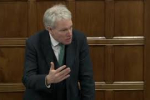
National Community Land Trust Network: launch of research evidencing community led housing provides medium to high value for money for public funding
In my conversations with Government, I get the impression there is genuine support and recognition of the value of Community Housing to communities. The question is its value to the taxpayer.
This is my radical perspective: I think there's a revolution underway across the West in our visions of the economy in our society. And we are seeing the end of a 40-year economic and social model that has delivered enormous benefits in so many ways. And yet, ultimately this model has failed in its original idea that as we de-industrialized, labour and capital would flow naturally to meet each other.
So, people coming from towns where the industry had disappeared, would move to places where there was work. And conversely, capital would flow into these places where labour and land were suddenly cheap. And therefore, there would be a natural meeting and prosperity for all, for both people and places.
It’s happened to a degree, but to an insufficient one. And speaking of degrees, people without them have been those who've suffered. And I think the recent electoral events, the referendum, and then the general election last year, obviously represent a revolutionary moment in which people from the places that have been left behind have rejected that model, and they want a different one. And that is what this government is committed to delivering.
Because we found that places are quite sticky. People don't want to leave them just in the prospect of a distant opportunity for some economic benefit in a distant place. They've got attachments and relationships and affections for the places that they're from. And capital doesn't seem to flow downhill in the way that people thought it would either. It only flows to places where there's the infrastructure and the social infrastructure that makes places liveable and attractive to businesses.
So, we've rediscovered place, that's what's going on. And it's this rather glorious, absurd, almost satiric moment we're in that in Westminster and Whitehall we've discovered the existence of geographical communities, and now trying to base policy around it, which is a very good recognition to have finally arrived at.
I think this is part of a general rejection of the big, large remote forces in the commercial economy or in the public sector. People don't want to be under remote bureaucracies, but they don't want to be alone either. There's a cultural change going on., and we've seen this in recent months: a distrust and a general scepticism about the ability of big systems, nationally managed systems, whether publicly managed or privately to deliver the responsiveness that's needed to the coronavirus crisis.
We've seen people coming together locally and spontaneously and organically, often with the support of local businesses and local authorities in the most amazing way. And that's the report that I've written for government.
So, these old ideas of place and community are back. We have this new paradigm of community power that needs to be recognised and adopted by our rulers. This paradigm expresses itself in all sorts of interesting ways: in the new movement around social enterprise, but also different models of public services. In every public policy area, community power is the missing piece of the puzzle. And housing does feel like the most important and the most obvious.
I first came across community led housing and community land trusts when I was working in the White City area of West London and the big housing estate there - supporting families and young people - and recognised the degree to which the residents of that estate had so little power over the millions and millions of pounds of public money that is spent on them and for them and around them, but never by them in any meaningful sense. I realised how much this came back to their tenancies and the tenure that they had as very transient and very disempowered residents of this place.
So I got interested in the notion of community ownership and got to know the great hero of Walterton and Elgin, Jonathan Rosenberg, the hero of WECH, the Walterton and Elgin Community Housing Association, which took over these two estates in North Westminster back in the 90s after a long battle with Westminster Council. Jonathan effectively declared UDI and set up the independent republic of Walterton and Elgin. He showed me around it once and told me where he'd like to site the machine guns and the passport stations to keep the council out.
Walterton and Elgin assumed control of its own land and tenants are their own landlords, and it's the most brilliant place. They've not only restored and improved the housing really dramatically there, they've densified the estate by public consent of residents, have built more housing, which is not what we’re used to people doing. They wanted more housing in their own estate.
There's lots to be said about urban, community led housing, but I’ll just finish with a word about what's happening in Wiltshire, which is where I'm an MP now. And of course CLTs began, as I understand it, as a rural housing solution in Scotland 100 years ago, and are particularly well suited to the challenge of finding new housing in rural areas. There are lots of schemes in the southwest, many supported by housing associations and developers for community led housing and community land trusts.
We do need more homes and where to put them is the question. The white paper sets out this very ambitious vision for much stronger neighbourhood planning. And I really support that: much more local decisions on design, great emphasis on beauty. But obviously, we need these neighbourhood plans to have real bite, unlike neighbourhood plans currently, and we need less of the appeal system, which basically ends up with most developments being decided in London. So, I think Community Housing is the way through. It’s the way to square the circle on more housing that people actually want locally.
In Great Bedwyn, a village near me in Wiltshire, there's an opportunity for dozens of new houses. The village want it, it'll keep the school going, and make the school viable. It’ll mean the teachers from the school will have somewhere as they can't even buy in their own village at the moment. They want to live in their own village, or the village that they're working in. These people's children can live there. There's a huge amount of support here, but only if the parish itself controls the housing. That is the condition that they're putting on it. They do not want to be given an arbitrary number by the government or the council and then some big developer come in and build a whole bunch of horrible housing that they have no say in the allocations of or the design of.
The way to build the housing we need is this model. There's 23,000 homes in the pipeline for Community Housing, which is great. It's very good number, but we need 300,000 homes a year. So, we need to up that number. And so, I am with you on the absolute need to revive the Community Housing Fund. I'm pushing hard for that. I very much support this campaign and that work. But, as I say, the challenge is demonstrating to the Treasury that there is real bang for the taxpayer’s buck.





